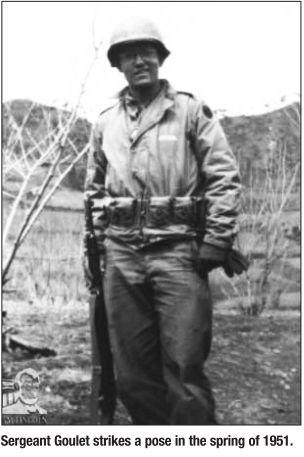
Springfield veterans remember Korean War 60 years later
VETERANS | Patrick Yeagle
During the cold December of 1951, 12 Illinois military service members lost their lives in the Korean War. Those Marines and Army troops from Illinois were among 1,754 Illinoisans and the 54,246 Americans killed 60 years ago in “The Forgotten War” that ran from June 1950 to July 1953.
To remember the 60th anniversary of “The Forgotten War,” the Abraham Lincoln Presidential Library and Museum compiled a month-by-month history of the Korean War, focusing on the role played by Illinois’ veterans in the war.
One such veteran is Carl Greenwood, 80, of Springfield. Greenwood jokes that he didn’t even know where Korea was in 1950, but his experiences there would change his life forever. He wrote a book about his military service as a Marine in Korea and helped write a separate educational booklet about the Korean War. He also spearheaded the construction of the Illinois Korean War Memorial, which now sits in Springfield’s Oak Ridge Cemetery.
Greenwood was a heavy machine gunner in the Marines during the Korean War, and he took part in the bloody and brutal Battle of Chosin Reservoir, which ran from Nov. 27 to Dec. 13, 1950. The battle pitted 30,000 United Nations troops, of which about half were American, against between 60,000 and 120,000 Chinese troops in deep snow and temperatures dipping to 40 degrees below zero – so cold it froze the plasma needed for blood transfusions for the wounded.
Though Greenwood and his fellow Marines were surrounded by Chinese troops deep in territory held by communist North Korea, they broke through the enemy’s lines and walked almost 80 miles to U.S.-controlled territory in South Korea, fighting most of the way and car rying the dead and wounded with them. In total, more than 3,000 American troops died and more than 6,000 were wounded.
In his book, titled Once Upon a Lifetime, Greenwood defiantly describes the Marines’ determination and will to survive during the battle.
“After we were informed we were going to fight our way out, we did just that,” he said. “If we weren’t supposed to make it out alive, someone forgot to tell us.”
Greenwood and several other Illinois veterans of the Korean War shared their experiences with Mark DePue, director of oral history for the museum, starting in 2007.
“I have one of the neatest jobs because I get to meet such neat people and hear the incredible stories they have,” DePue told Illinois Times. “My job is to preserve their history, and I take that every seriously. … They tend to be overlooked, but you can’t match their bravery, or the pain or the anguish of the experiences they had.”
Bernie Goulet, 80, of Springfield, recalled during a 2009 interview with DePue what Goulet called his saddest memory from his time in Korea, where he served as an infantryman in the U.S. Army’s 7th Infantry Division.
During the Battle of Chosin Reservoir, Goulet witnessed the bodies of servicemen who were in the battle being transported to a nearby cemetery by the truckload.
“The trucks kept coming; they were stacked with dead people – with dead Marines, GIs,” Goulet said. “They would turn in there at that Hamhung Cemetery; that was such a sad little cemetery. They had a little American flag there. There was always sort of a breeze, and that flag was always stretched out tight, waving there. That made such an impression on me that I get very impatient when I see the flag being insulted, today even.”
The Korean War is often seen as “The Forgotten War” because it followed so closely on the heels of World War II and was later overshadowed by the Vietnam War.
The Korean War is considered to have ended with an armistice on July 27, 1953, but the lack of an actual treaty means that relations between North Korea and South Korea remain tense and are occasionally marked by violence. A 2.4-mile wide “Demilitarized Zone” divides the Korean Peninsula at the 38th Parallel even today.
An educational booklet about the Korean War is available for $10 from Flag World, 2206 S. Sixth St. in Springfield, or by sending a check or money order to the Illinois Korean Memorial Association, P.O. Box 8554, Springfield IL, 62731.
Oral histories from Illinois veterans are available online at http://tinyurl.com/vet-history.
Contact Patrick Yeagle at [email protected].